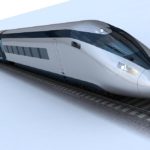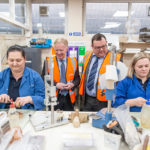Sector - Transport & Infrastructure
Leeds receives HS2 boost

The Transport Secretary has confirmed plans for a HS2 depot to be based in Leeds.
The new depot will see Yorkshire become a thriving hub for training engineers, with High Speed trains maintained and serviced at the depot.
The site, in the Aire Valley west of Leeds, was chosen following public consultation, with the new location having fewer environmental impacts in the region – reducing the distance empty trains travel to and from Leeds station for overnight stabling, as well as reducing the impact of HS2 on the village of Crofton, where the depot site was previously proposed.
It is hope the hub will act as a catalyst for regeneration, driving productivity and investment for the region. Creating up to 125 skilled jobs, the hub will ensure Yorkshire benefits from the arrival of HS2, holding a crucial role in enabling 24-hour maintenance of the brand new high-speed trains.
Construction of a localized hub builds upon HS2’s commitment to create more than 100,000 new jobs and 2,000 apprentices, with the National Colleges for High Speed Rail in Doncaster and Birmingham able to train 1,200 students a year at full capacity. In addition, the University of Leeds’ new Institute for High Speed Rail and System Integration will train postgraduate engineers through MSc and PhD places, helping to provide a flow of skilled experts into the industry.
Chris Grayling, Transport Secretary, said: “Constructing this vital depot in Leeds underlines how the benefits of HS2 drive prosperity right across the UK, with Yorkshire playing a crucial role in maintaining the new high speed trains and delivering significantly better journeys for passengers.
“The depot will act as an economic catalyst, creating skilled jobs, boosting the local economy by unlocking regeneration opportunities and driving continued investment.
“This ensures Leeds will not only see immediate benefits when HS2 arrives but will see Yorkshire become a thriving hub for training the engineers that HS2 and future major projects will need.”
If you would like to read more articles like this then please click here.
Related Articles
More Transport & Infrastructure News
- How technology can improve supply chain resilience in infrastructure project delivery
5 Apr 24
Major infrastructure projects rely on supply chains being resilient in the face of unexpected challenges.
- Lincolnshire gateway approved
2 Apr 24
Plans to transform part of the East Lincolnshire coast have taken an important step forward
- Lord Banner KC to lead review on national infrastructure
25 Mar 24
Top planning barrister, (Lord) Charles Banner KC, will lead an independent review to look into





